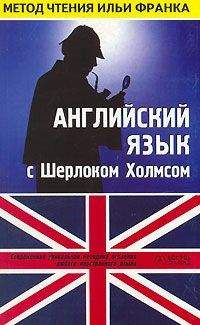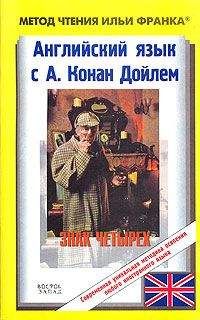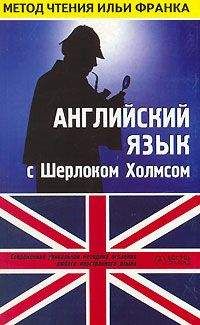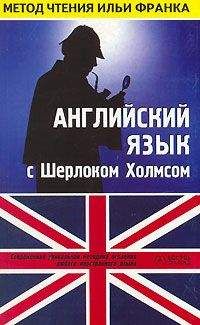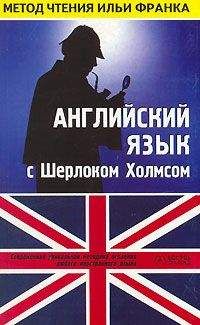“Nothing, until my uncle here began to speak loudly. I heard that, and I came down.”
“You shut up the windows and doors the night before. Did you fasten all the windows?”
“Yes.”
“Were they all fastened this morning?”
“Yes.”
“You have a maid who has a sweetheart (у вас работает горничная, у которой есть возлюбленный)? I think that you remarked to your uncle last night (вы говорили дяде вчера вечером) that she had been out to see him (что она вышла повидаться с ним)?”
“Yes, and she was the girl who waited in the drawing-room (да, она была той девушкой, что подавала нам /кофе/ в гостиной; to wait — ждать; прислуживать, обслуживать /за столом и т. п./). And who may have heard uncle’s remarks about the coronet (и /была тем/ кто мог слышать замечания дяди о диадеме = как дядя рассказывал о диадеме).”
“I see (понятно). You infer that she may have gone out to tell her sweetheart (вы подразумеваете, что она могла выйти из дому и сообщить /об этом/ своему возлюбленному; to infer — заключать; делать /логический/ вывод; выводить /заключение, следствие; из чего-л./; делать предположение, высказывать догадку), and that the two may have planned the robbery (и они вместе могли спланировать ограбление).”
“But what is the good of all these vague theories (но какой толк от этих всех туманных предположений; vague — расплывчатый),” cried the banker impatiently (нетерпеливо воскликнул банкир; patient — терпеливый), “when I have told you that I saw Arthur with the coronet in his hands (ведь я уже сказал вам, что видел Артура с диадемой в руках)?”
“Wait a little, Mr. Holder (подождите немного, мистер Холдер). We must come back to that (мы к этому /еще/ вернемся). About this girl, Miss Holder (/теперь/ относительно этой девушки, мисс Холдер). You saw her return by the kitchen door, I presume (полагаю, вы видели, как она вернулась через дверь кухни)?”
“Yes; when I went to see if the door was fastened for the night I met her slipping in (да, когда я пошла посмотреть, заперта ли на ночь дверь, я увидела, как она тихо входила; to slip in — прокрасться, незаметно войти; to slip — скользить). I saw the man, too, in the gloom (я также видела в темноте ее поклонника).”
“Do you know him (вы знаете его)?”
sweetheart [ˈswi:thɑ:t], vague [veɪɡ], impatiently [ɪmˈpeɪʃ(ǝ)ntlɪ], presume [prɪˈzju:m]
“You have a maid who has a sweetheart? I think that you remarked to your uncle last night that she had been out to see him?”
“Yes, and she was the girl who waited in the drawing‑room. And who may have heard uncle’s remarks about the coronet.”
“I see. You infer that she may have gone out to tell her sweetheart, and that the two may have planned the robbery.”
“But what is the good of all these vague theories,” cried the banker impatiently, “when I have told you that I saw Arthur with the coronet in his hands?”
“Wait a little, Mr. Holder. We must come back to that. About this girl, Miss Holder. You saw her return by the kitchen door, I presume?”
“Yes; when I went to see if the door was fastened for the night I met her slipping in. I saw the man, too, in the gloom.”
“Do you know him?”
“Oh, yes! he is the green-grocer who brings our vegetables round (он зеленщик, который приносит нам овощи). His name is Francis Prosper (его зовут Фрэнсис Проспер).”
“He stood (он стоял),” said Holmes, “to the left of the door — that is to say (слева от двери, другими словами), farther up the path than is necessary to reach the door (дальше по дорожке, чем необходимо, чтобы достать до двери)?”
“Yes, he did.”
“And he is a man with a wooden leg (и это человек с деревянной ногой)?”
Something like fear sprang up in the young lady’s expressive black eyes (что-то похожее на страх промелькнуло в выразительных черных глазах юной леди).
“Why, you are like a magician (да вы словно волшебник),” said she. “How do you know that (откуда вы это знаете)?” She smiled, but there was no answering smile in Holmes’s thin, eager face (она улыбнулась, но на худощавом напряженном лице Холмса не появилось ответной улыбки).
“I should be very glad now to go upstairs (теперь мне бы очень хотелось подняться наверх),” said he. “I shall probably wish to go over the outside of the house again (возможно, мне снова захочется обойти дом; outside — наружная сторона). Perhaps I had better take a look at the lower windows before I go up (быть может, лучше сначала взглянуть на нижние окна, прежде чем подниматься).”
vegetables [ˈveʤ(ǝ)tǝblz], necessary [ˈnesɪs(ǝ)rɪ], answering [ˈɑ:nsǝrɪŋ]
“Oh, yes! he is the green-grocer who brings our vegetables round. His name is Francis Prosper.”
“He stood,” said Holmes, “to the left of the door — that is to say, farther up the path than is necessary to reach the door?”
“Yes, he did.”
“And he is a man with a wooden leg?”
Something like fear sprang up in the young lady’s expressive black eyes.
“Why, you are like a magician,” said she. “How do you know that?” She smiled, but there was no answering smile in Holmes’s thin, eager face.
“I should be very glad now to go upstairs,” said he. “I shall probably wish to go over the outside of the house again. Perhaps I had better take a look at the lower windows before I go up.”
He walked swiftly round from one to the other (он быстро обошел /первый этаж/, переходя от одного /окна/ к другому), pausing only at the large one which looked from the hall onto the stable lane (остановившись лишь у большого окна гостиной, которое выходило на дорожку, ведущую к конюшне). This he opened and made a very careful examination of the sill with his powerful magnifying lens (он открыл его и очень тщательно осмотрел подоконник с помощью мощной лупы; magnifying lens — лупа; увеличительное стекло; to magnify — увеличивать; усиливать).
“Now we shall go upstairs (теперь пойдемте наверх),” said he at last (сказал он наконец).
The banker’s dressing-room was a plainly furnished little chamber (гардеробная банкира представляла собой просто обставленную маленькую комнатку), with a gray carpet (с серым ковром), a large bureau (большим бюро), and a long mirror (и высоким зеркалом). Holmes went to the bureau first and looked hard at the lock (Холмс сначала подошел к бюро и внимательно посмотрел на замок).
“Which key was used to open it (каким ключом его открыли: «какой ключ использовался, чтобы отпереть его»)?” he asked.
“That which my son himself indicated (тем самым, о котором говорил мой сын) — that of the cupboard of the lumber-room (ключом от шкафа в чулане; lumber — ненужные громоздкие вещи; хлам).”
“Have you it here (он у вас здесь)?”
“That is it on the dressing-table (он на туалетном столике).”
pausing [ˈpɔ:zɪŋ], magnifying [ˈmæɡnɪfaɪɪŋ], mirror [ˈmɪrǝ]
He walked swiftly round from one to the other, pausing only at the large one which looked from the hall onto the stable lane. This he opened and made a very careful examination of the sill with his powerful magnifying lens.
“Now we shall go upstairs,” said he at last.
The banker’s dressing-room was a plainly furnished little chamber, with a gray carpet, a large bureau, and a long mirror. Holmes went to the bureau first and looked hard at the lock.
“Which key was used to open it?” he asked.
“That which my son himself indicated — that of the cupboard of the lumber-room.”
“Have you it here?”
“That is it on the dressing‑table.”
Sherlock Holmes took it up and opened the bureau (Холмс взял его и открыл бюро).
“It is a noiseless lock (замок бесшумный),” said he. “It is no wonder that it did not wake you (не удивительно, что он вас не разбудил). This case, I presume, contains the coronet (в этом футляре, полагаю, находится диадема; to contain — содержать, вмещать). We must have a look at it (нужно взглянуть на нее).” He opened the case, and taking out the diadem he laid it upon the table (он открыл футляр, достал диадему и положил на стол).
It was a magnificent specimen of the jeweller’s art (это был великолепный образец ювелирного искусства), and the thirty-six stones were the finest that I have ever seen (и тридцать шесть камней были прекраснейшими /из камней/, которые я когда-либо видел). At one side of the coronet was a cracked edge (с одной стороны диадемы край был отколот), where a corner holding three gems had been torn away (там, где зубец: «уголок» с тремя бериллами был отломан).
“Now, Mr. Holder,” said Holmes, “here is the corner which corresponds to that (вот зубец, который соответствует тому) which has been so unfortunately lost (что был к несчастью утерян). Might I beg that you will break it off (могу я попросить вас отломить его).”
The banker recoiled in horror (банкир отшатнулся в ужасе; to recoil — отскочить, отпрыгнуть; отпрянуть).
“I should not dream of trying (и не подумаю),” said he.
wonder [ˈwʌndǝ], magnificent [mæɡˈnɪfɪs(ǝ)nt], specimen [ˈspesɪmǝn]
Sherlock Holmes took it up and opened the bureau.
“It is a noiseless lock,” said he. “It is no wonder that it did not wake you. This case, I presume, contains the coronet. We must have a look at it.” He opened the case, and taking out the diadem he laid it upon the table.
It was a magnificent specimen of the jeweller’s art, and the thirty-six stones were the finest that I have ever seen. At one side of the coronet was a cracked edge, where a corner holding three gems had been torn away.
“Now, Mr. Holder,” said Holmes, “here is the corner which corresponds to that which has been so unfortunately lost. Might I beg that you will break it off.”
The banker recoiled in horror.
“I should not dream of trying,” said he.
“Then I will (тогда я попробую).” Holmes suddenly bent his strength upon it, but without result (Холмс внезапно напряг все силы, но безрезультатно; to bend — сгибать/ся/; приложить /усилия/; направить /энергию/). “I feel it give a little (чувствую, что немного поддается),” said he; “but, though I am exceptionally strong in the fingers (но, хотя у меня исключительно сильные пальцы), it would take me all my time to break it (потребовалось бы много времени, чтобы отломить зубец). An ordinary man could not do it (обычный человек не смог бы этого сделать). Now, what do you think would happen if I did break it, Mr. Holder (как вы думаете, что бы произошло, если бы я действительно отломил его, мистер Холдер)? There would be a noise like a pistol shot (раздался бы треск, /похожий/ на пистолетный выстрел). Do you tell me that all this happened within a few yards of your bed (и вы говорите, что все это произошло в нескольких ярдах от вашей кровати) and that you heard nothing of it (а вы ничего не слышали)?”
